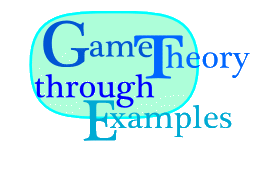
3-PERSON ROCK-SCISSORS-PAPER Ann, Beth, and Cindy simultaneously play Rock-Scissors-Paper. If all three show the same, or all three different values, then it is a draw. Otherwise there are two winners and one loser, or one winner and two loser. In these cases, every loser pays every winner $1.
3-PERSON MORA Three players put $1 each on the desk. Then they simultaneously show one or two fingers and call a number between three and six. The number closer to the sume of the number of fingers shown by the players together wins the money on the desk. In case of a tie, they share. (Analysis of the game)
Can forming a cooperation help to win more than the otherwise expected 0? Cooperation would of course require communication before the move, and also committment to the coalition. It is not allowed to form a secret coalition with the "enemy", negotiating with your coalition partner first a strategy, and after that telling the hidden coalition partner how to play. Also, we are assuming that the money won can be distributed within the coalition after the game--- side payments are allowed.
The maybe surprising answer is that in the first game coalition building is pointless, since even in a coalition you cannot win more than 0, wheras in the second game the coalition has an advantage over the single player.
Cooperative: Forming coalitions, and how to share the outcome.
Throughout, there must be some tools enforcing agreements. Moreover, payoffs must be movable between players, otherwise coalitions couldn't share their win.
The worthof a coalition is the highest outcome a coalition can get.